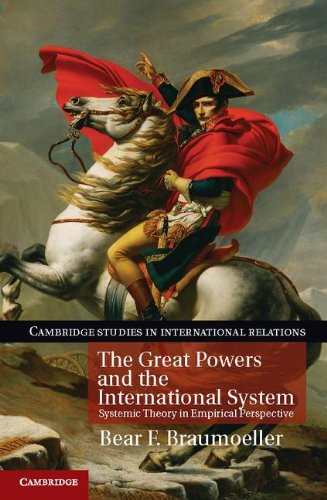 Systemic theories are those that explore the interactions of units (people, animals, planets) with their environments. Despite being fairly common in other disciplines, systemic theories are exceptionally rare in political science.
Systemic theories are those that explore the interactions of units (people, animals, planets) with their environments. Despite being fairly common in other disciplines, systemic theories are exceptionally rare in political science.
In this book, I take on a longstanding debate: Do great leaders make history? Or are they compelled to act by historical circumstance? This debate has remained unresolved since Thomas Carlyle and Karl Marx framed it in the mid-nineteenth century, yet implicit answers inform our policies and our views of history. I argue that both perspectives are true: the international environment has an impact on interstate interactions, and for this reason, people seek to alter their environment.
Studies of the Congress of Vienna, the interwar period, and the end of the Cold War support the argument and illustrate this dynamic, and an examination of data from the end of the Napoleonic Wars to the end of the Cold War provides systematic evidence that leaders both shape and are constrained by the structure of the international system.
Winner, 2014 Best Book Award, International Studies Association
Winner, 2014 J. David Singer Book Award, ISA-Midwest
Honorable Mention, ISA International Security Studies Section Best Book competition
Reviews
“Braumoeller has established himself as one of the great international theorists of our age and should be commended for his highly sophisticated and intellectually articulated treatise. At the same time, it is a book that is sure to become an instant classic in the field of international relations.” —Michael Cairo, H-Diplo Reviews
“It’s much easier to hit pitches the greats never even swung at—can you believe how little guidance extant lit offers when it comes to piracy off the coast of Somalia? Or the use of Twitter bots to sway public opinion regarding immigration?—than to score runs off curveballs they were lucky to catch a piece of. Yet, every once in a while, someone swings for the fences. A wonderful example of this is Bear Braumoeller’s The Great Powers and the International System.” —Phil Arena, Duck of Minerva
“The scholarship in this book is of the highest order as it is rich in novel ideas, impressive erudition, and sophisticated empirical analysis. It is one of the benchmarks on several levels: as a study of great powers, as a general theory of international politics, and as a multi-method approach for understanding the course of history.” —International Studies Association Best Book Award announcement
“Each of the case studies in Chapter 4 is strong in its own right, but the example on the end of the Cold War is simply a tour de force. It is the single most convincing narrative on this topic that I have read.”—John Agnew, Journal of Politics
“Braumoeller presents the first logically sound and empirically tested systemic theory of international relations. He challenges systemic theorists such as Waltz and Wendt and combines rigorous theory, historical analysis, and statistical testing in one coherent package. He engages a wide range of literatures and debates, from the agent-structure debate to computational systems theory to the historical legacy of the Congress of Vienna, all with keen intelligence and even wit.” —Andrew Kydd, University of Wisconsin
“Neither structural theories nor agent-based theories can adequately account for the fact that the system influences the behavior of states and states act to shape the system. Through rigorous theorizing, sophisticated statistical tests, and historical case studies, Braumoeller explains these reciprocal dynamics, and in the process transcends existing theoretical debates. This is systemic theory at its best. It deserves the fullest attention of all serious international relations scholars.” —Jack S. Levy, Board of Governors’ Professor, Rutgers University
“Bear F. Braumoeller’s The Great Powers and the International System: Systemic Theory in Empirical Perspective accomplishes what no other scholarly work has effectively done by bridging the agent-structure gap and arguing for a truly systemic theory of international relations.” —Michael Cairo, Transylvania University, H-Net Reviews
